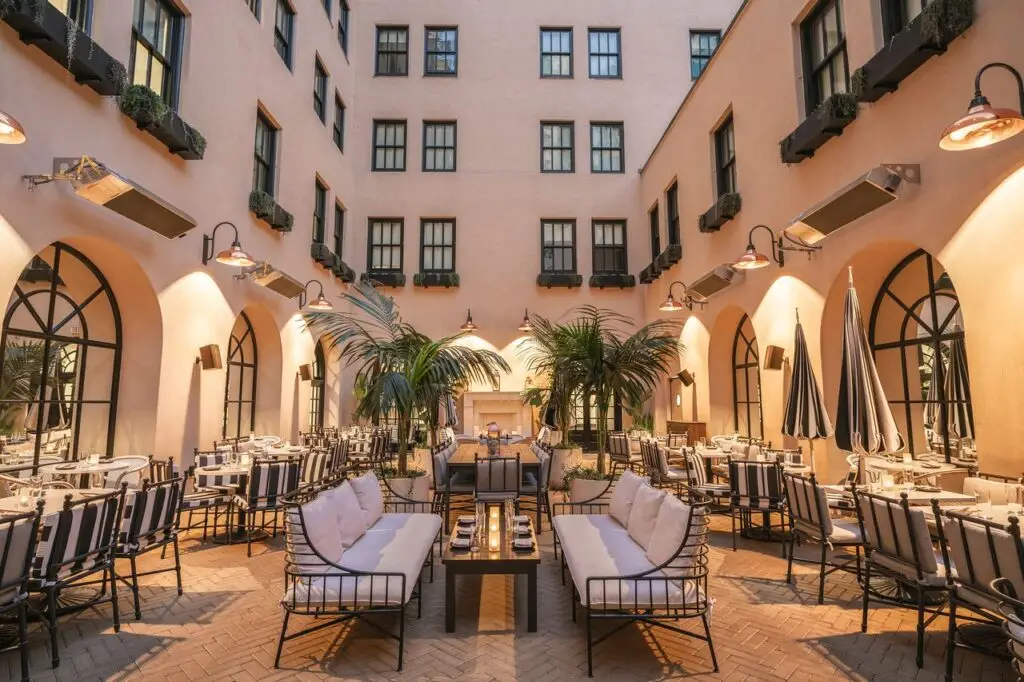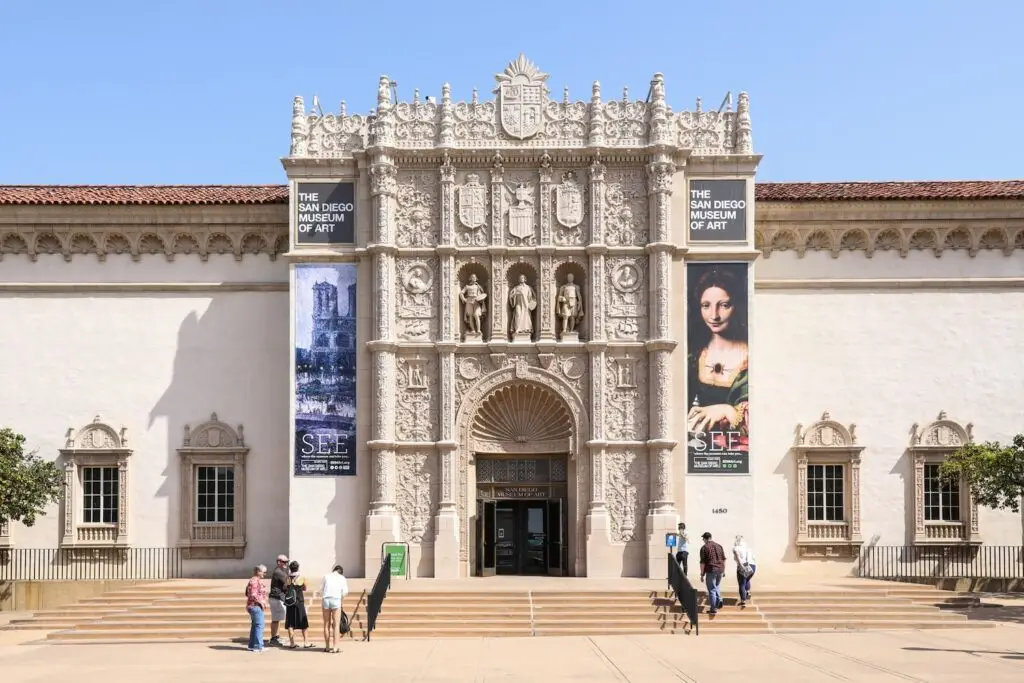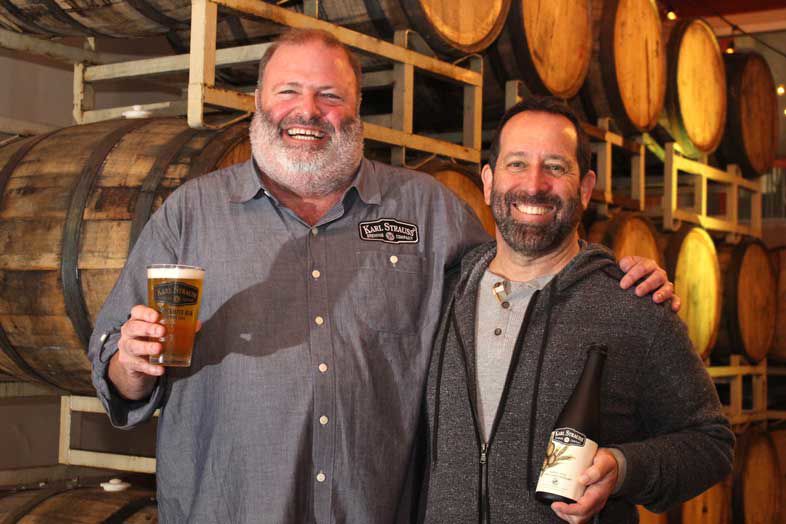Thirty years is a long time, especially in the context of San Diego beer. So many new breweries have opened their doors in the past few years that a fifth or a tenth anniversary is a big deal. But 30 years? That’s truly remarkable.
Three decades ago, San Diego was a craft beer desert (as was most of America). Many of the folks who started brewing in the 1980s—pioneers like Fritz Maytag, Ken Grossman, Jim Koch, Mark Carpenter, Garrett Oliver, Dan Gordon—had originally been turned on to beers with real flavor from Europe. Karl Strauss founders Chris Cramer and Matt Rattner were no different. In the mid-’80s, fresh out of business school, they were inspired by the great beers they tasted while traveling abroad, and they decided to build a brewery in downtown San Diego to make beers that could match the flavor and quality of the ones they admired most.
Matt and Chris were young when they first started their business in 1988, but they had one invaluable resource that would help ensure their success. His name was Karl Strauss. A longtime master brewer with a classic European background in brewing, Karl had a worldwide reputation by the time he agreed to help Matt and Chris, who is Karl’s cousin. Karl consulted on the design and building of the entire brewery, helped them procure ingredients, and trained the brewers in all aspects of how to make world-class beer. Without Karl, there would have been no brewery on Columbia Street in 1989. That’s why every bottle and can produced there bears his name.
In the years since their first tank of beer came out of the fermenter (Amber Lager), Matt and Chris have seen their little operation grow into San Diego’s second-largest independent brewery (surpassed only by Stone) and they now rank 41st on the list of America’s largest. Some of their other stats are just as impressive. In 1989, total beer production was about 600 barrels. Today, with the main production facility and their 10 brewpubs combined, Karl Strauss is making nearly 84,000 barrels annually. And the beer they’re making is particularly good: Since they began entering competitions in 2009, Karl Strauss beers have won 110 medals. Their flagship Red Trolley Irish Red is probably the most-medaled red ale of all time—22 so far.
A pioneering company that’s been around for three decades tends to influence lots of other people. Through the years, the brewery has mentored and graduated a virtual Who’s Who of San Diego brewing; the short list includes Pizza Port cofounder Gina Marsaglia, Home Brew Mart and Ballast Point founder Jack White, Callahan’s cofounder Scott Stamp, Second Chance founder Marty Mendiola, original Green Flash brewer Chuck Silva, current Green Flash brewer Erik Jensen, and brewer Pat Korn (formerly of Cellar 3).
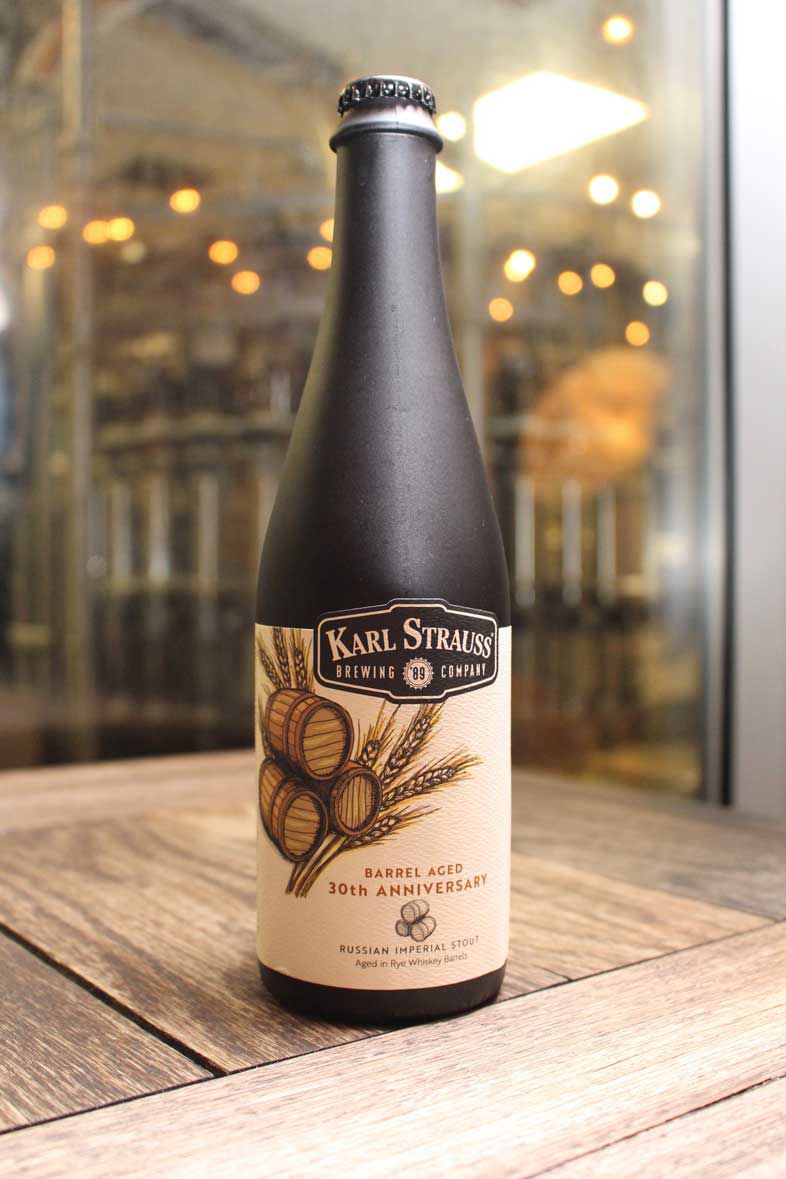
Karl Strauss Turns 30
A Russian Imperial Stout aged in Rye Whiskey barrels is the special 30th anniversary release | Photo: Bruce Glassman
Saturday, February 2 was officially Karl Strauss Brewing Company’s 30th birthday. Despite pouring rain, the craft beer community gathered in full force to celebrate at their Pacific Beach tasting room. Before things got into high gear, I pulled Matt and Chris aside for a quick chat and a chance to reminisce. Here are a few of the things we talked about.
When you guys look back on the last thirty years, what makes you smile the most?
Matt: That we’re still here thirty years later!
Chris: I think back to some of the funny things that happened when we first opened up. I think back to our original bartender, Scott Stamp. I remember that in 1989 it was the era of neon. We had these horrible neon-colored hats that we offered as merchandise, and they didn’t sell very well. So we made our bartenders wear the hats to promote selling them and the bartenders hated them! Especially Scott!
What are the most significant milestones that stand out to you?
Chris: The one that jumps to my mind immediately was the opening of Disney’s California Adventure back in 2000. Here it was, one of the greatest companies in the world, and they selected Karl Strauss to be the featured craft beer for their very first new theme park, which was unlike any they’d ever built before. Matt and I were there at the opening party, The Beach Boys were onstage playing, all these celebrities from LA were there, and Karl Strauss beer was on tap at all the bars. It was at that point I turned to Matt and said, “I think we’ve finally arrived.”
Matt, how about you? What’s your most significant milestone?
Matt: It has to be winning the Mid-Size Brewing Company of the Year award at the Great American Beer Festival in 2016. We were the only Southern California company ever to do it.
Chris: That was huge. It still is huge. When I think about how hard it is to win these competitions, it’s incredible that our talented team of brewers has so consistently been winning medals since we first started doing it in 2009. You know, when we think about the fact that we could have been competing all those years when it was so much easier, we think we probably could have been the all-time medal winner! If we had only started competing twenty years earlier!
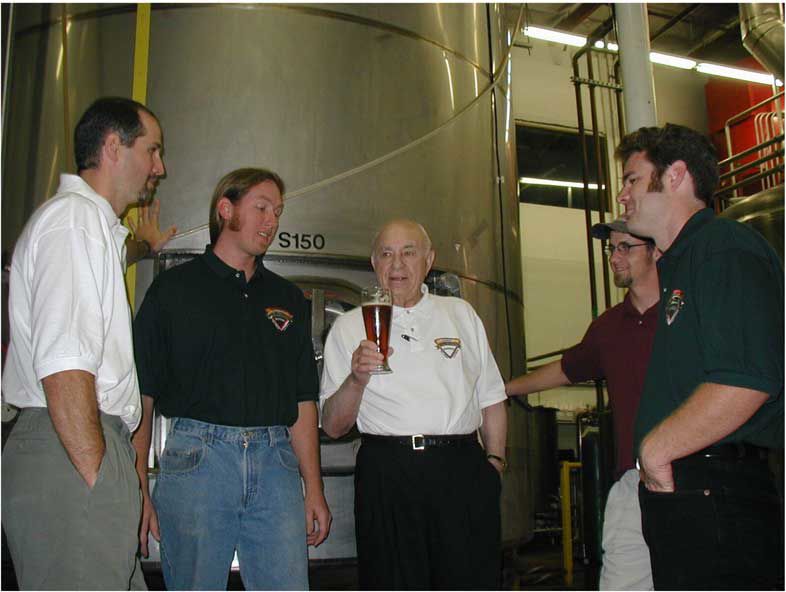
Karl Strauss Turns 30
Master Brewer Karl Strauss (center) mentored all the brewers for the company, including Matt Walsh, Bill Fuson, Erik Jensen, and current Brewmaster Paul Segura (white shirt, left) | Photo courtesy of Karl Strauss
Let’s talk for a minute about Karl Strauss, the man. What is it that you most want people to know about him?
Chris: First of all, people should know that he was a real human being. Some people think that he was just a made-up marketing character, but Karl was one of the greatest brewers who has ever lived. He was also this warm, generous, humorous human being who was absolutely at the top of his field internationally. He was one of the most famous brewers in the world. He was the only brewer to have ever won the Master Brewers Association of the Americas’ three highest honors. He was a gracious and kind gentleman who made everyone who interacted with him feel loved and special. He had that gift of friendship that he gave away freely and it was an inspiration to me. In this industry, you really have to make friends. I mean, that’s what beer is all about. Friendship and enjoying time together. And Karl was the one who inspired us to build a company based on the spirit of friendship.
Matt: I would also mention the fact that Karl was so committed to quality—he emphasized it in his training and teaching of so many brewers here—that it became an important aspect of why San Diego is now a leading brewing hub and marketplace.
Going back to 1988, San Diego’s craft beer scene was pretty bleak, yes?
Chris: The craft beer scene didn’t exist.
Matt: Yeah, I think San Diego was the number-one market for Coors Light at that time!
Chris: I grew up out here and it was all mostly light beer. I mean, that was fine. Beer wasn’t all that interesting back then. I think Matt and I saw an opportunity, with what was happening in other parts of the world, where people were starting enjoy more interesting and extraordinary flavors, including wine and coffee, and just better-quality beverages. And we thought the same thing would happen here with beer. So, with Uncle Karl providing the brewing expertise, we did something that a lot of people thought was absolutely crazy. We decided we were going to make these new styles of beer that people in this area had never tried before.
Matt: And Karl was really instrumental in helping us design the layout of the brewery, helping us choose the equipment, getting the ingredients, and designing the recipes for the first beers. There were no homebrew stores back when we started. There was no way to get small quantities of ingredients. We had to figure out how to get yeast and get smaller shipments of grain that weren’t whole truckloads.
Chris: He leveraged the relationships that he’d developed to help us. And he trained the brewers. Everybody got personally trained by Karl. And it was his focus on quality that really made our company stand out. I mean, I think we were the 300th brewery to open up in the country—which seems like a lot—but a lot of them made wildly inconsistent beer. Karl’s philosophy was that you couldn’t build a sustainable business model unless you put quality first and had the brewing skills to make consistently excellent beer. So, when we first opened downtown, we had set the bar very high. And the rest of the industry that grew up around us then had to produce really good beer or else they would have been judged negatively. I think that’s partly what has driven San Diego to become such a craft beer mecca.
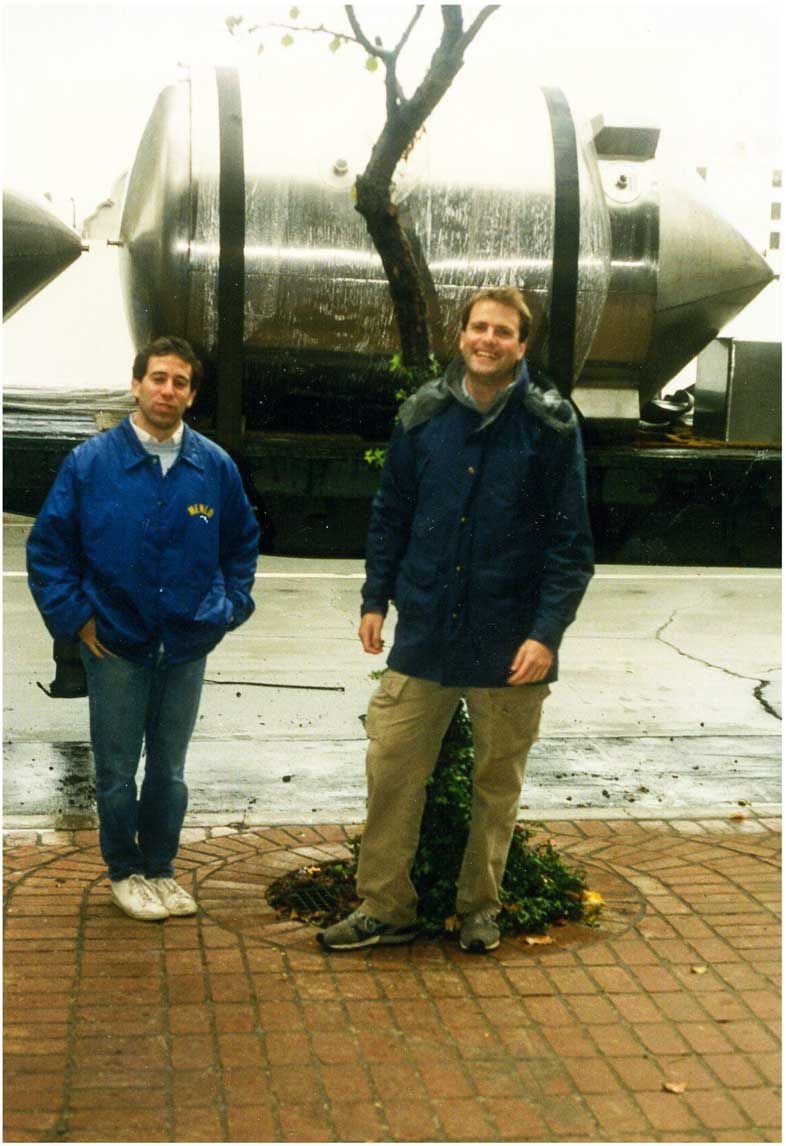
Karl Strauss Turns 30
Matt and Chris stand in front of the first fermenter as it arrives on Columbia Street, 1988 | Photo courtesy of Karl Strauss
Okay, one last question. Thirty years is a long time for a partnership to last. Chris, what is it about Matt that’s enabled you guys to stick together that long? (Matt, I’ll ask you the same about Chris.)
Chris: Well first of all, it’s Matt’s integrity and his intelligence. Secondly, he’s about as different from me as anyone on the planet. People often wonder how we wound up being partners, and I always say that you don’t want to choose somebody who’s exactly like you as a business partner, because then you just replicate each other’s mistakes. With Matt, I have somebody who I trust implicitly, and I know he shares the same values that are important to me. And even though, over thirty years, we’ve disagreed completely about a lot of things, we’ve always been able to work it out.
Matt: I would say it’s similar core values, as Chris said, and also different social styles. Chris has been good enough to be on a whole bunch of brewery boards, to be active in the CCBA and the BA, and to do all the travel. He’s been willing to be the “outside guy,” which has allowed me to focus internally here on process and systems.
Chris: You know, when we first started working together, it was obvious to both of us what each of our skill sets were. When it came to responsibilities and roles, there were “Matt things” and there were “Chris things.” Matt essentially works on “today,” and I’m almost all about working on “tomorrow.” He’s kind of “inside and today,” and I’m kind of “outside and tomorrow.”
That kind of partnership seems to have worked well.
Chris: You know, I look at our company today and we’ve never operated this well. And our chances have never been as good as they are today. We look at the future and there are a lot of craft breweries that are probably going away, but we’re growing. I think the next thirty years are going to be the wildest ride of our lives!
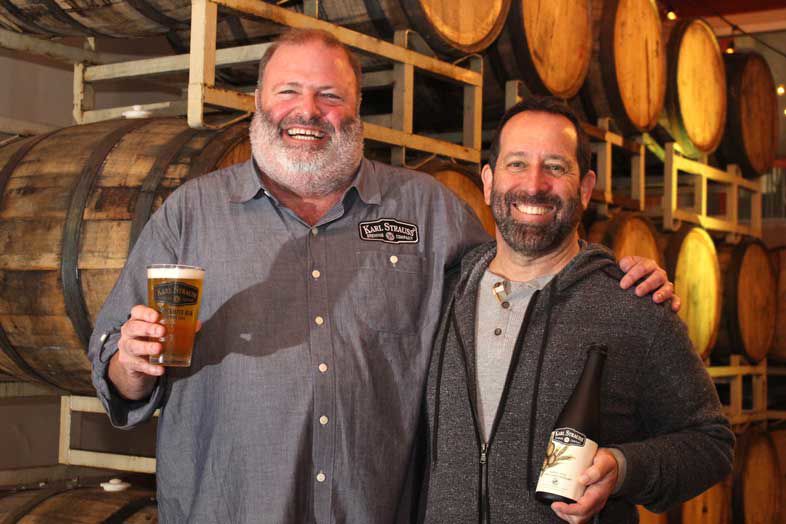
Karl Strauss Turns 30
PARTNER CONTENT
Co-founders Chris Cramer (left) and Matt Rattner started Karl Strauss Brewing Company in 1989, on Columbia Street downtown | Photo: Bruce Glassman

